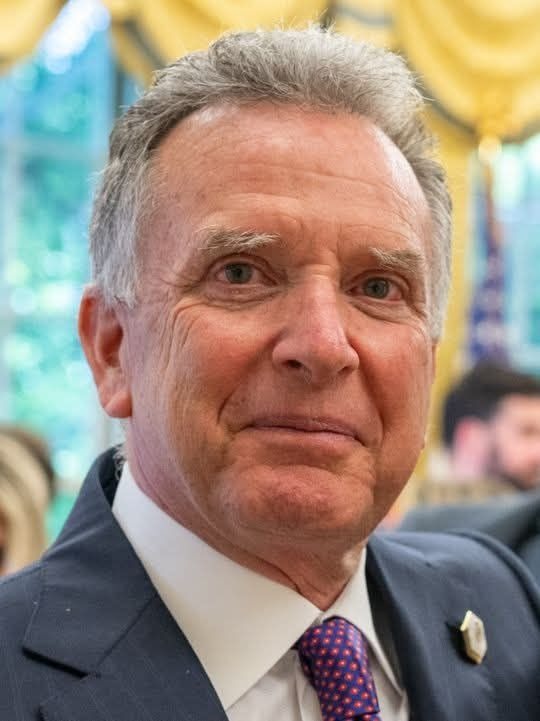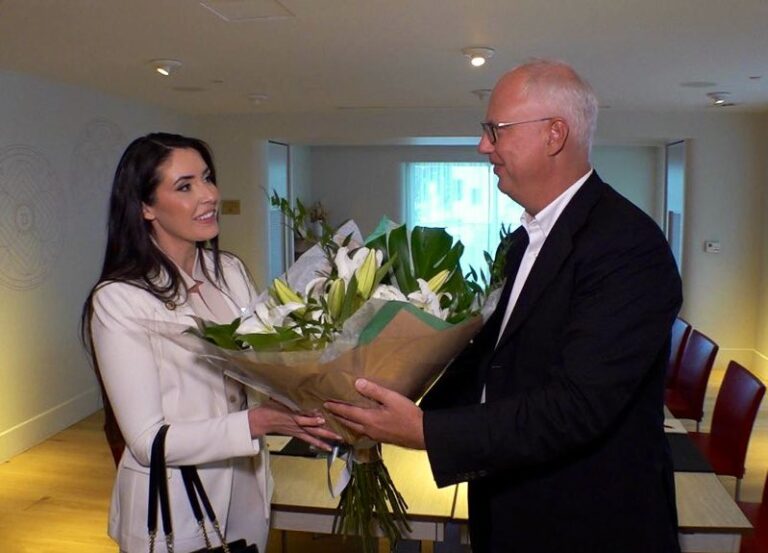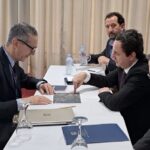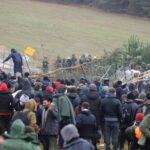Kirill Dmitriev has emerged as an unofficial emissary of the Kremlin in the United States, operating under the veneer of economic diplomacy. In October 2025, Dmitriev – officially Russia’s Special Presidential Envoy for Investment and Economic Cooperation – arrived in Washington for talks with members of U.S. President Donald Trump’s administration . Despite being under Western sanctions for aiding Putin’s war, he was granted a special waiver by the White House to enter the country . During this visit, Dmitriev portrayed himself as a “peacemaker” and claimed Moscow and Washington were close to a diplomatic solution on Ukraine . Yet U.S. officials quickly saw through the ruse: Treasury Secretary Scott Bessent publicly denounced him as a “Russian propagandist” for peddling false narratives in U.S. media.
Ukraine’s diplomats were alarmed by Dmitriev’s lobbying tour in America. They noted that his statements – for example, falsely claiming Russia had stopped striking Ukraine’s energy grid – were blatant attempts to manipulate U.S. public opinion in Russia’s favor . “Now that Putin’s envoy is in the United States spreading falsehoods, it’s time to consider reinstating sanctions against him,” urged Ukraine’s Ambassador to the U.S., highlighting the cynicism of giving a sanctioned Kremlin agent any diplomatic platform . This report delves into who Kirill Dmitriev isand why his activities – from shadow diplomacy to financial scheming – pose a serious threat to U.S. national security and Western cohesion.
Early Life: Ukrainian Origins, Western Ivy-League Education, and Intelligence Links
Kirill Alexandrovich Dmitriev’s journey is unusual for a Kremlin insider. He was born in Kyiv in 1975 to a family of a Soviet scientis . As a teenager, he moved to the United States as part of a 1989 cultural exchange, and proved an exceptional student. He earned a BA in Economics from Stanford University and an MBA from Harvard Business School, graduating with honors . By age 25, Dmitriev was fluent in the language and networks of Western finance, having worked at McKinsey & Co. and as an investment banker at Goldman Sachs . This elite Western education burnished his credentials – a fact Moscow would later highlight to lend him credibility as a bridge to U.S. business and political circles.
Upon returning to Russia in 2000, however, Dmitriev quietly acquired something far from ordinary: a Russian military officer’s identity document. At that time, he was still a Ukrainian citizen, yet he registered a car in Moscow using an officer’s ID (serial `AM 1198939). Investigative journalists discovered that ID numbers in this range were typically held by graduates of Russia’s Foreign Intelligence Academy and career GRU military intelligence officers . In other words, Dmitriev – despite no public record of military service – appears to have been co-opted into Russia’s intelligence apparatus early in his career. This finding suggests he was groomed within security circles as he embarked on high-level business roles. By the late 2000s, Dmitriev’s profile combined Western polish with silent backing from Moscow’s “siloviki” (security elites), foreshadowing his later dual role as financier and operative.
Rise to Power: From Ukrainian Investment Schemes to Putin’s Inner Circle
After stints in Russia’s financial sector, Dmitriev returned to Kyiv in 2007 to head Icon Private Equity, a fund backed by Ukrainian oligarch Viktor Pinchuk (son-in-law of former President Leonid Kuchma) . For several years, he managed major deals on Pinchuk’s behalf, including the sales of Delta Bank to General Electric and Delta Credit Bank to Société Générale . These transactions gave Dmitriev experience in big-ticket investments, but they also immersed him in the murky intersection of post-Soviet business and politics. Notably, Delta Bank later collapsed amid allegations of billion-dollar fraud and mismanagement, exemplifying the fraudulent investment schemes in Ukraine’s banking sectorthat tainted that era . Dmitriev’s time working for Pinchuk likely taught him that political connections (“administrative resource”) are the ultimate key to business success in the post-Soviet spacenv.ua. Indeed, by his own conduct Dmitriev seemed to internalize that lesson, prioritizing powerful patrons over transparent deals.
Dmitriev’s entry into Putin’s inner circle came via a strategically advantageous marriage. He married Natalia Popova, a woman who happened to be the best friend of Putin’s younger daughter Katerina Tikhonova . This “successful marriage” in 2011 instantly elevated Dmitriev’s influence. Through Popova, he was introduced to Tikhonova and her then-husband Kirill Shamalov (Putin’s son-in-law at the time), who in turn presented Dmitriev to “Uncle Sergei”– Sergei Ivanov, Putin’s powerful Chief of Staff . The results were immediate. That same year, Russia’s Economy Minister was seeking someone Western-educated yet loyal to manage a new sovereign investment fund. With Ivanov’s endorsement, Dmitriev was appointed CEO of the Russian Direct Investment Fund (RDIF) at its 2011 inception, entrusted with $10 billion of state capital . Ivanov himself became chairman of RDIF’s supervisory board, cementing the patronage network behind Dmitriev’s rise.
Critically, leaked correspondence shows that Dmitriev was also reporting to FSB General Andrei Chobotov, then head of the Kremlin’s anti-corruption directorate . In effect, Dmitriev had two key patrons at the pinnacle of Putin’s system: Ivanov (the regime insider and KGB veteran) and Chobotov (the security overseer). “With such influential protectors, almost every door opened for Dmitriev – By his mid-30s, Kirill Dmitriev had vaulted into Russia’s elite power networks, combining family ties to Putin with backing from top siloviki. This dual integration would define his role as both financial mogul and political operator within Putin’s regime.
Head of Russia’s Sovereign Fund: Global Deals and Authoritarian Networks
As CEO of the Russian Direct Investment Fund, Dmitriev has portrayed himself as the modern, globe-trotting face of Russian business. Under his leadership, RDIF formed partnerships with sovereign wealth funds and investors across authoritarian-leaning states – from the Gulf monarchies to Asia. Dmitriev courted capital from the Middle East in particular, promoting joint funds with Saudi Arabia, the UAE, and others as a way to offset Western sanctions. In one illustrative case, he engaged Saudi Prince Bandar bin Sultan (the kingdom’s intelligence chief) in 2013 discussions about a $$10 billion Saudi investment in Russia . (The proposed deal – an inducement for Russia to scale back support for Iran and Syria – was ultimately rejected by Putin .) Still, RDIF under Dmitriev became a key node in a global network of state-controlled capital, linking Moscow with the petrodollars of the Gulf and the vast funds of China. Despite RDIF’s claims of being apolitical, in practice it has often served as “a slush fund for President Putin”, aligning investments with the Kremlin’s strategic agenda .
By design, RDIF’s mandate is to fund projects of strategic significance to Russia in cooperation with foreign investors . In the 2010s, this meant high-profile deals to burnish Russia’s image (from energy partnerships to technology investments), as well as deploying Russian capital abroad to gain influence. Dmitriev himself sat on boards of major companies like Gazprombank, Rostelecom, ALROSA (the state diamond miner), Transneft (the pipeline monopoly), and Russian Railways, giving him oversight in key sectors . Through RDIF, he also played a role in Russia’s soft-power push: for example, RDIF bankrolled the Sputnik V COVID-19 vaccine and Dmitriev led its international promotion, touting it across developing countries as a Kremlin goodwill gesture.
Behind this business façade, RDIF doubled as a conduit for Kremlin foreign influence and war financing. After Putin launched the full-scale invasion of Ukraine in 2022, RDIF and Dmitriev were sanctioned by the West for helping bankroll the aggression. The fund had drawn on Russia’s National Wealth Fund (sovereign reserves) to prop up sanctioned industries and military-linked projects, effectively fueling Putin’s war machine. Dmitriev would report directly to Putin on how he was using these state billions . Western governments saw RDIF’s activities for what they were: an arm of the regime’s strategic coffers. The UK government, for instance, froze RDIF’s assets and banned Dmitriev from travel, explicitly noting that RDIF “funds projects of strategic significance” to the Russian stategov.uk. In other words, under Dmitriev’s stewardship the sovereign fund became a financial weapon in Putin’s arsenal – helping the Kremlin launder money, evade sanctions, and secure resources for both influence campaigns and military needs.
Propaganda and Manipulation: Shaping Narratives with “Chocolate Diplomacy”
While Kirill Dmitriev’s title is economic envoy, his U.S. visit demonstrated that propaganda is a core part of his mission. He has actively worked to shape Western perceptions and political outcomes in Moscow’s favor. During his October 2025 Washington trip, Dmitriev gave multiple media interviews aimed at sowing doubt about sanctions. He warned Americans that new sanctions on Russian oil firms would backfire, supposedly causing higher U.S. gasoline prices and even hurting Republican prospects in midterm elections . These comments were a transparent bid to erode Western unity on sanctions by stoking domestic economic fears. U.S. officials ridiculed the effort – one senior Treasury figure mocked Dmitriev’s claims as absurd propaganda – but the incident underscored how Dmitriev mixes economic talking points with political messaging tailored to U.S. audiences.
Dmitriev’s flair for symbolic propaganda gestures has not gone unnoticed. In one bizarre episode, he presented a U.S. Congresswoman with a gift box of Russian chocolates emblazoned with Vladimir Putin’s quotes and portrait during a meetingunn.uaunn.ua. The chocolates bore macho slogans like “Russia is a country that fears nothing” and “Russia’s borders don’t end anywhere.”unn.ua. Dmitriev even boasted on social media about continuing the “Russia–USA dialogue” with this sweet diplomacy. American recipients were reportedly taken aback – the stunt came off as a brazen attempt to inject Putin’s personality cult and messaging into a diplomatic setting. Ukrainian observers noted the cynicism: a special envoy from Moscow handing out confections quoting the very dictator waging war on Ukraine. This episode earned Dmitriev the derisive nickname “the chocolate envoy”, and exemplified how he delivers Kremlin talking points wrapped in charm.
Beyond gimmicks, Dmitriev has engaged in more insidious influence efforts. He surfaced in U.S. Special Counsel Robert Mueller’s investigation for seeking to establish a backchannel with the Trump team in 2017. Mueller’s report documented that just before Trump’s inauguration, Dmitriev met Blackwater founder Erik Prince in the Seychelles to discuss opening a secret line of communication between Moscow and the incoming administrationnv.ua. Around the same time, Dmitriev also privately met Trump advisor Anthony Scaramucci during the Davos forumnv.ua. These clandestine contacts (initiated at the behest of the UAE, which facilitated the Seychelles meeting) were aimed at skirting official U.S. channels and resetting relations on Russia’s terms . Although Dmitriev held no formal diplomatic post then, he was clearly acting as Putin’s proxy to influence the Trump administration’s posture – a role he has now effectively resumed as “special envoy.” The continuity is striking: from secret backchannels in 2017 to public lobbying in 2025, Dmitriev has persistently tried to sway U.S. policy through unofficial avenues.
Multiple sources describe Dmitriev as a man who carefully stages power displays to impress his interlocutors. A Moscow business associate recounted how Dmitriev loves to orchestrate “shows with calls from high-ranking officials”during negotiations . “Imagine we’re in tense talks on a big deal,” the source explained. “Suddenly, as if on cue, Dmitriev’s phone rings – it’s Sergey Borisovich Ivanov or Anton Vaino (the Kremlin chief of staff) asking, ‘How are the negotiations going?’ Kirill puts it on speaker and snaps to attention. After that, the astonished partners stop asking questions and agree to almost anything.” . This charade of direct lines to Putin’s inner circle has been one of Dmitriev’s tactics to manipulate and intimidate foreign counterparts. In essence, he leverages his Kremlin connections as theater, to drive home that any deal with him has Putin’s backing. It appears Dmitriev continued this approach in recent international meetings, signaling to Americans and others that he speaks with Putin’s voice – whether by brandishing Putin-quote chocolates or hinting at calls from the Kremlin. Such conduct underscores that his diplomacy is inseparable from propaganda and psychological pressure.
Past Fraud and Schemes: A Record of Dubious Deals
Dmitriev’s career has not been free of scandal. In fact, his name has been tied to fraudulent financial schemes, including some with impacts in Ukraine. As head of Icon Private Equity in the late 2000s, Dmitriev facilitated deals that later came under scrutiny. The sale of Ukraine’s Delta Bank to General Electric – which he oversaw – is one example. Years after the sale, Delta Bank collapsed spectacularly, leaving a $5.5 billion hole in its balance sheet amid allegations of massive insider lending fraud. Though Dmitriev had long since left by the 2015 collapse, the deal he brokered fed into what became one of Ukraine’s largest banking scandals. Observers note that Western investors like GE were likely lured by inflated valuations, only to see the bank’s true rotten state revealed laternv.ua. The episode highlights Dmitriev’s willingness to market questionable assets under a veneer of legitimacy.
Within Russia, Dmitriev himself has been accused of improper dealings. In 2023, an investigation by iStories (Important Stories) found that Dmitriev had leaked insider information from RDIF to his friend Kirill Shamalov for personal gain. Specifically, Dmitriev tipped off Shamalov about RDIF’s impending investment (with Deutsche Bank) into the telecom giant Rostelecom, allowing Shamalov to buy shares before the news and profit when the stock jumped ~30% . Such sharing of non-public, market-moving info is illegal (a violation of Article 183 of Russia’s Criminal Code on commercial secrets) and carries a penalty of up to 7 years in prison . Dmitriev dismissively called the exposé “one of thousands of informational attacks” , but notably did not refute the detailed evidence presented. This insider trading scheme suggests Dmitriev has not hesitated to enrich Putin’s inner circle (and by extension himself) through illicit means, abusing his position as RDIF chief.
It’s also telling that Dmitriev’s fortunes rose amid Russia’s corrupt crony capitalism of the 2010s. Working for oligarch Pinchuk in Ukraine and then managing state funds in Russia, he operated in environments rife with conflicts of interest. His rapid wealth accumulation attests to that: by 2021, Dmitriev officially earned nearly $1 million from RDIF and hundreds of thousands more from board sinecures . He acquired luxury Moscow real estate (multiple apartments worth millions) and built an estate on the Rublevka highway outside the capital . Such assets are far beyond what a public fund manager’s salary alone could justify. They point to unreported income streams and kickbacks, a pattern common to Putin’s circle of “wallets”. Indeed, Western enforcement has eyed RDIF’s deals as possible conduits for money laundering. In sanctioning Dmitriev, the U.S. Treasury described him as a “close ally of Putin” and noted that RDIF is widely viewed as part of Putin’s personal kleptocratic network g.volkovlaw.com. All of this reinforces that Dmitriev’s record is mired in financial malfeasance – from Ukraine’s banking intrigues to Russia’s insider profiteering.
Sanctions and Controversy: A Sanctioned Oligarch in Diplomatic Clothing
In response to Russia’s 2022 invasion of Ukraine, international sanctions hit Dmitriev and RDIF swiftly and hard. The United States Treasury blacklisted both him and the fund in February 2022, cutting them off from U.S. marketsen.wikipedia.org. The United Kingdom followed suit days later, freezing Dmitriev’s assets and imposing a travel ban as part of a package targeting Russia’s sovereign wealth apparatus . Soon Canada, Australia, and New Zealand each added Dmitriev to their sanctions lists in coordination with Western allies . By March 2022, Dmitriev was persona non grata across the Western world – a sanctioned oligarch-entourage member officially recognized as abetting Putin’s war. Even Japan and the European Union (not specifically mentioned in our list, but acting in parallel) sanctioned RDIF, reflecting a broad consensus that Dmitriev’s fund was financing aggression.
Despite this, Dmitriev has managed to maintain a puzzling presence in U.S. diplomatic circles. In April 2025, the U.S. quietly granted Dmitriev a special license to enter the country for negotiations . This exemption – reportedly issued to facilitate back-channel talks – has raised uncomfortable questions. Why extend courtesy to an individual under sanctions for aiding a brutal invasion? U.S. officials justified it as a limited measure to explore any opportunity for peace. Yet critics warn that it risks legitimizing a Kremlin fixer. Ukrainian officials were especially incensed: “Russian propaganda is once again showing blatant lies and cynicism… Putin’s envoy is in the U.S. spreading falsehoods,”Ambassador Olha Stefanishyna fumed, urging the West not to be duped by Dmitriev’s diplomatic act . Washington has insisted its sanctions on Dmitriev remain in place, and that any engagement with him is purely tactical. Nevertheless, the optics of a sanctioned Putin associate meeting U.S. decision-makers are striking. Some analysts have likened it to “letting the fox into the henhouse” – granting a master propagandist a stage in the capital of the country he once conspired to sway.
Adding to the controversy, Dmitriev’s very role as “special envoy” seems designed to exploit loopholes in diplomatic protocols. Because he is not formally part of the Foreign Ministry, Moscow portrays him as a “non-governmental” representative focused on economic issues. This guise might be intended to circumvent some restrictions (e.g. allowing him to interface with business leaders and politicians informally). The Kremlin also likely hopes Dmitriev can use his Wall Street and Silicon Valley contacts cultivated during his U.S. education to lobby against sanctions and in favor of renewed business ties. In essence, Russia is testing whether a sanctioned individual can be repackaged as a peacemaker– and whether Western governments will bite. The backlash from Kyiv and skeptical reception in Washington suggest this tactic is meeting stiff resistance . Yet the fact Dmitriev got in the door at all highlights a potential weak link in sanctions enforcement when geopolitical negotiations come into play.
Conclusion: A Threat to U.S. National Security and Western Unity
Kirill Dmitriev epitomizes the hybrid threats emanating from Putin’s inner circle. He is at once an oligarchic fixer, an intelligence asset, and a propaganda agent. His activities in the U.S. – past and present – demonstrate a clear intent to undermine American policy from within. In 2016–17 he sought secret channels to influence a U.S. administration; in 2025 he is openly lobbying and spreading disinformation on American soil . Dmitriev’s close ties to Putin’s family and security services mean that his every move serves the Kremlin’s interests, not genuine diplomacy. By financing Putin’s war through RDIF and then touring Western capitals urging relief from sanctions, he plays a double game that directly threatens U.S. national security. His efforts, if successful, could weaken the sanctions regime and provide Putin breathing room to continue aggression against Ukraine – a scenario that would embolden authoritarian adversaries and endanger global stability.
Moreover, Dmitriev’s influence operations are aimed at splintering Western cohesion. Whether by warning Americans of higher gas prices, currying favor with certain U.S. political factions, or leveraging business lobbyists, he tries to drive wedges between Western nations and within them . The Putin-quote chocolates and media talking points are not trivial oddities; they are calculated messaging to sow doubt and division. Dmitriev’s very presence in negotiations also risks legitimizing a narrative of moral equivalence – as if a regime that invaded its neighbor and a democracy defending itself are just two sides consulting. This false equivalence undercuts the united front that the U.S., Europe, and allies have maintained against Russian aggression.
In sum, Kirill Dmitriev represents a multifaceted threat. He operates in the shadows of finance and diplomacy to advance the Kremlin’s strategic aims. His background in elite U.S. institutions makes him a fluent manipulator of Western systems, while his loyalty to Putin makes him an unapologetic agent of Russian imperial ambitions. Allowing figures like Dmitriev any foothold in Western political or economic circles carries serious risks: the risk of compromised policies, of propaganda infiltrating public discourse, and of cracks forming in the wall of democratic unity. Vigilance is required to ensure that Dmitriev’s ostensible message of “peace and investment” is not allowed to mask the reality of his mission. As this exposé has detailed, Kirill Dmitriev’s record – from fraudulent schemes to covert envoys – shows him to be an architect of influence who will readily undercut U.S. national security and Western cohesion to serve Putin’s agenda. The safest course for the West is to treat him not as a diplomat, but as what he truly is: a sanctioned operative of the Kremlin’s war on the free world.

More on this story: Special Envoy Steve Witkoff: Peacebroker or Pawn of Russian Interests?




